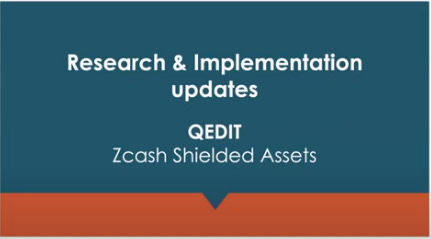Arborist Call #99 | R&D Summary (04/17/2025)
The Zcash Arborist Calls are bi-weekly protocol development meetings focused on tracking upcoming protocol deployment logistics, consensus node implementation issues, and protocol research.
This summary focuses on the last call that took place on 04/17/2025
Zebra now avoids overwriting user-mounted config files in Docker. It also supports running tip height and copy state commands while another instance is using the same database. The getaddresstxids RPC was improved to match zcashd by making start and end heights optional.
More improvements to Zebra RPCs:
getrawtransaction now includes more missing fields in verbose output. getpeerinfo was updated to show inbound peer info.
The outdated getblocktemplate RPC has been removed.
A V6 transaction variant was merged behind a feature flag.
Ongoing work in Zebra includes deduplicating shared logic with Sensor, restoring the internal miner, matching zcashd’s getaddressbalance RPC by adding a received field, and adding value pool information to the getblock RPC output.
A new version of zcashd (v6.2.0) is out with just over a week left before v6.1.0 halts, it's time to upgrade. The release is available on all the usual platforms, including app repositories and Docker Hub. Don’t wait—update now.
Big strides on Zallet, Recent PRs bring it closer to a functional alpha. The last major piece—ZSA support—is in progress. Work is also underway to migrate wallet data from zcashd using tools from Blockchain Commons.
@ElectricCoinCo Core Team is actively tuning the wallet migration process using the Zwift Wallet Interchange Format.
The goal: allow Zallet to import from zcashd and support syncing and sending from the migrated wallet—likely ready by the next Arborist Call.
A heads up for devs: v6.2.0 deprecates createrawtransaction (not removed yet). A more modular approach to transaction creation is coming via new tooling.
Also, upstream ZK crypto crates are being updated to align with new crate releases.
Kris shared that @ElectricCoinCo has been working closely with the Zaino team to align expectations for Zallet integration. Progress is being made toward a shared API path and clearer separation between Zaino, ZebraD, and related components.
Work on atomic swaps spans across a new Librustzcash branch and txtool version. A dedicated Zebra version is also in development. While atomic swaps are progressing well, the main focus remains on completing and reviewing Orchard ZSA.
Pablo shared that ZSA ZIPs are nearing completion.
Final touches are being worked on with ECC, and reference implementations are almost ready. Recent reviews came in for Halo 2 PR, and the extensive Orchard crate changes needed for ZSA.
The initial review of the Orchard crate is underway, kicking off a deep dive into the significant changes needed for ZSA support. These discussions mark an important step toward advancing shielded asset integration in the Zcash ecosystem.
Alongside ZSA progress, work is advancing on atomic swap functionality. A modified version of Orchard now supports multiple action groups, enabling each participant to add actions that combine into a single transaction bundle.
@shieldedmark shared that major progress has been made on NSM-related PRs. His transaction PR for Zebra is already merged, and the NU7 PR is nearly there.
Once the NU7 PR is in, focus shifts to NSM PRs and the supporting Librustzcash updates. Everything is properly flagged and safe for review.
Momentum is building fast—big things ahead for the Network Sustainability Mechanism.
@SamHSmith2 from Shielded Labs shared exciting updates! Malachite integration supports arbitrary payloads for BFT. Block proposals with custom messages like “Hello Arborist” are live in test rounds—showing off real-time consensus in action. Watch it here:
@azmreece added updates to the visualizer: nodes now branch with a force-directed layout to show a balanced tree view, you can import test outputs directly for deeper insights.
Syncing improvements are in! Nodes can now be turned off and reconnected to catch back up with the network. P2P punch-through support is also on the horizon. Big UX and testability wins from the @ShieldedLabs team this week.
The Frost core and cipher suite crates were already audited and released. Now, the tooling layer is almost complete. These CLI tools show how Frost works—and can be reused or integrated into bigger apps and services. Next up? Potential PCCT support.
The same quantum-safe trick applies to Zcash viewing keys—letting wallets prove spend authority by proving knowledge of the spending key (sk). This works well in Orchard, but not for Sapling (too complex). Users must migrate before quantum threats emerge.
Long term, the goal is full Frost wallet integration—but that will require ecosystem collaboration. ZIP 312 (specifying how Frost fits into Zcash) is still waiting for review. If you're interested in quantum-resilient Zcash, now's the time to get involved!
Because FROST hasn’t launched yet, its key structure can still be optimized for post-quantum recovery. If needed, it can gracefully degrade from k-of-n to 1-of-n multisig in a quantum world. Huge design win for Zcash's future resilience!
Zcash devs are drafting a ZIP to make Orchard shielded notes quantum recoverable. The plan: bind note commitments to quantum-hard hashes (like Blake2b), so if quantum computers arrive, users can migrate funds to secure notes before legacy circuits are disabled.
To enable quantum recoverability, FROST wallets can’t just randomly generate keys anymore.
You need structure: SK → QK → all key material. Why? Because only hash-derived keys give you a quantum-secure backup path.
Deploying this with NU7 (ZSA launch) means EVERY new note is quantum recoverable from day 1. Avoid Sprout-style headaches later. No messy migrations. Protect shielded coinbase too—if we accept the consensus tweak.















